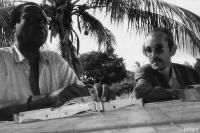Focus on Tonga Ngoma Buntibe music / Tonga Tonkunst
The Valley Tonga live in the middle Zambezi Valley on both sides of the Zambezi River in Zambia and Zimbabwe. Upstream is the Victoria Falls, downstream is Kariba Dam. The Valley Tonga are the third largest ethnic group in Zimbabwe after the Shona and Ndebele.
The best known fact about the Tonga is that they were forcibly removed from the banks of the Zambezi River forty years ago to make way for the building of Kariba. Once deported from their habitat, they were abandoned.
In recent years, they have gained some outside attention largely through the beauty of their material culture (in particular their basket work and their goblet drums) which have become popular with the tourist trade.
Before the dam, the Tonga were able to grow two crops a year. Their winter gardens were made possible by the flooding of the Zambezi river which brought rich alluvial soils every year. The ground they now live on since their displacement is desperately poor and barely sustains one yearly crop of drought-resistant sorghum. Furthermore, they are plagued by damage done to their crops from wildlife which they are now forbidden to hunt.
The Tonga are a marginalised people who do not share in the luxuries of modern life in Zimbabwe. Until recently, they viewed outsiders with suspicion and their remote position has not encouraged investment in the area. Even the advantages of electricity and tourism which Kariba dam brought to the cities, have bypassed the Tonga almost completely.
Find more background Information and oral history accounts in: Our Gods Never Helped Us Again. A publication of Panos that highlights the resettlement challenges of the Tonga people during the building of the Kariba Dam, see pdf att.
Although the Tonga lost so much with the coming of Kariba, they managed to maintain their cultural identity. The KUNZWANA & AZFA Tonga Cultural Project was set up to find ways in which the Valley Tonga people might exploit this distinct and vibrant heritage to their own advantage.
The ngoma buntibe group SIMONGA at Siachilaba takes its name from the composer (mwimbi), called Simonga, who fled with his relatives from fighting chiefs in Zambia to Siachilaba sometime towards the beginning of this century. He was the grandfather of Sialwindi Munkuli, the present leader of Simonga and the keeper of the horns in central Siachilaba today.
In 1994, Simonga presented a performance of Valley Tonga buntibe music as part of a Festival Trail, the last segment of the Houses of Stone Festival organised by KUNZWANA Trust.
In 1995, a similar event took place as part of a cultural safari organised by members of the Austria-Zimbabwe Friendship Association in Linz, Austria in conjunction with KUNZWANA.
Keith Goddard describes this encounter:
"When a 35-year old Austrian folk violinist meets a Tonga women and her friends in Siachilaba, Zimbabwe (as happened in December 1995), plays his violin and collectively they come up with a song together, this is communication in its most powerful form. The communication tools on this occasion were a four-stringed musical instrument made from wood and cat gut, a rattle, the human voice and a spontaneous dance.
This impromptu exchange came at the end of numerous e-mail and fax messages, timetabling, international phone calls, personal discussions, express mail deliveries and snail-mail letters. In the end, the real communication came from a magic spark of people conversing informally and directly using only the code of tonal frequences: two people from cultures in separate regions of the world, totally unconnected socially, totally unaware of the existence of each other until they met on the last day of 1995. ..True, there is more than one musical language but in music there is not the same pressure to understand every word."
The Valley Tonga have a tradition of composers, those who invent music specifically for the buntibe. Siachilaba's most distinguished living composer is Siankwede. Both the words and the music for his compositions come to him in dreams and are passed to him by the masabe ancestral spirits. Siankwede's music is typical of the nyele repertoire: most of his songs are warnings about and exposure of socially unacceptable behaviour, in particular the revelation of murder.
Simonga is one of three ngoma buntibe groups in the area of Siachilaba.
The composer for the neighbouring buntibe team at the fishing camp of Sinamatelele is Peter Mwembe, whose composition, Toende Tukulime, became the basis for part of the electro-acoustic composition by Keith Goddard and Klaus Hollinetz which is featured as part of the composition project in Six Reflections on Tonga Music.
| Attachment | Size |
|---|---|
| our-gods-never-english-ot_rst_kar_eng-1.pdf | 4.58 MB |

